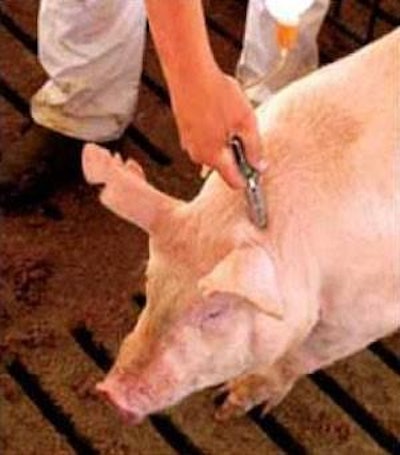
Globally, over 500 million young boars are castrated surgically each year. The number for the 25-country European Union alone exceeds 100 million annually. The cost to the industry is huge in terms of lost efficiency compared with producing pork from intact males. It is all in the name of taking away the chemical compounds from carcase tissues that might otherwise give the pork a tainted taste. By name, they are 5-alpha-androstenone and skatole. The first of these is a pheromone issued from cells of the testis that develop during puberty, while skatole is a product of the breakdown of the amino acid tryptophan in the pig's gut.
So said speakers at a recent European meeting organised in association with the IPVS veterinary congress by Pfizer Animal Health. They noted that slaughtering boars at a younger age gave no guarantee of eliminating taint because modern lines are often early-maturing. The risk of an objectionable taste or odour to boar pork could be diminished by the surgery to remove the testicles or, in theory, by trying to screen carcases in the abattoir or by sexing boar semen in order to produce gilt-only slaughter stock. There is an alternative which is more practical, they remarked, that of vaccination.
Technically, the immunocastration vaccine first developed in Australia suppresses testicular function and consequently interrupts the process leading to the formation of taint-related compounds. It is applied subcutaneously to the neck of the intact male in 2 doses given at least 4 weeks apart, with the second dose usually 4-5 weeks before slaughter. Pfizer reported that the Improvac product, already introduced to the Australian and New Zealand markets up to 8 years ago, was currently "in the European regulatory process" hoped to lead to EU-25 registration perhaps within the next year.
Just as the surgical castrate is less efficient than the intact male at producing pigmeat, the immunocastrate may be poorer on feed conversion and thicker in backfat. But comments at the time of the meeting revealed that producers in Australia and researchers in the USA have been considering whether the answer may be to correct these traits by administering a combination of ractopamine (Paylean) and immunocastration.
Australian advisers also commented that some of their clients use the vaccine to reduce aggression or stop excessive mounting by pigs in groups of newly mixed boars. The association of androstenone and aggressiveness is well known internationally. Socially dominant males have been reported to possess more of the compound and to stimulate its generation by their pen-mates.

















